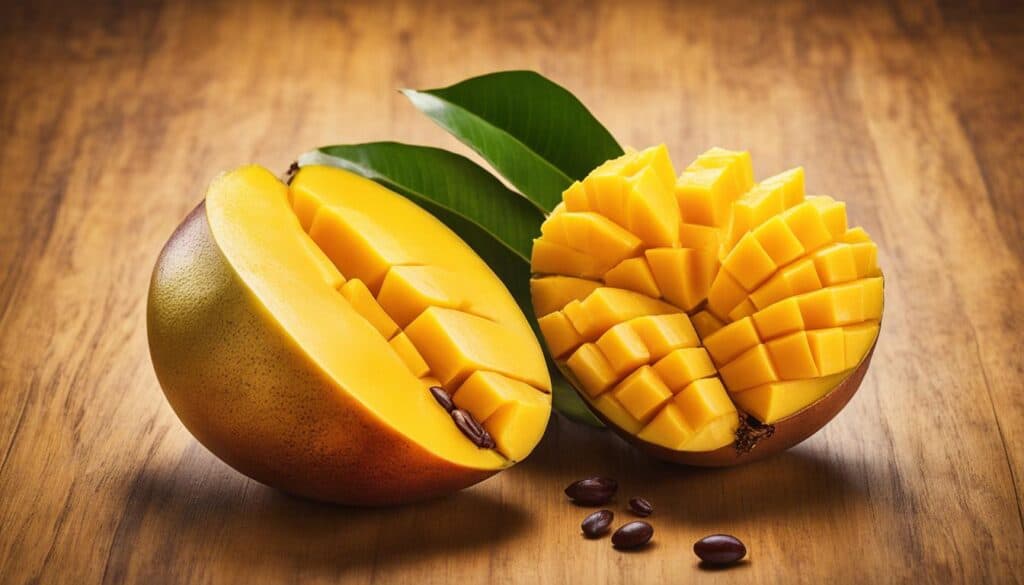When it comes to the most delicious fruit in the world, there are plenty of options to choose from. As a professional copywriting journalist, I have had the privilege of exploring different fruits and experiencing their unique flavors. Based on my personal taste and research, I am excited to present my top pick for the world’s tastiest fruit.
But before I unveil my selection, let’s take a moment to appreciate the wide variety of options available. Tomatoes, apples, bananas, oranges, and mangoes are among the most consumed fruits globally, and for good reason. Not only are they incredibly flavorful, but they also offer a range of essential nutrients and health benefits.
Key Takeaways:
- Tomatoes, apples, bananas, oranges, and mangoes are some of the most delicious fruits in the world.
- These fruits are not only tasty but also packed with essential nutrients.
- Tomatoes are rich in vitamins C and K, potassium, and lycopene.
- Apples provide vitamins A, B, C, and E, fiber, and antioxidants.
- Bananas are high in potassium and fiber, while oranges are loaded with vitamin C and fiber.
- Mangoes are a tropical fruit rich in vitamins A, C, and E, beta carotene, and fiber.
Tomatoes – The Versatile Fruit
Did you know that tomatoes are technically classified as a fruit? Yes, it’s true! Despite their common association with vegetables, tomatoes are, botanically speaking, fruits. This is because they contain seeds, which is a defining characteristic of fruits. However, in culinary terms, they are often treated as vegetables due to their savory flavor profile and common usage in savory dishes.
When it comes to popularity, tomatoes take the lead as the most consumed fruit in the world. With annual production reaching over 170 million tons, it’s no wonder they hold such a special place in our hearts and on our plates.
One of the reasons why tomatoes are so beloved is their incredible versatility. They can be found in an array of cuisines and dishes, adding a burst of flavor and vibrancy. Whether it’s in sauces, soups, salads, or even as a condiment, tomatoes have a way of enhancing the taste of any dish they grace.
But taste isn’t the only reason to include more tomatoes in your diet. These vibrant fruits are also a nutritional powerhouse, offering an array of health benefits. Tomatoes are low in calories but high in essential vitamins and minerals. They are an excellent source of vitamin C, which supports a healthy immune system, and vitamin K, which plays a crucial role in blood clotting and bone health. Tomatoes are also rich in potassium, which helps regulate blood pressure, and folate, which is essential for proper cell division and DNA synthesis.
One of the standout compounds in tomatoes is lycopene, a powerful antioxidant responsible for their deep red color. Research suggests that lycopene may have numerous health benefits, including reducing the risk of heart disease and certain types of cancer, such as prostate and lung cancer.
But there’s more! Tomatoes also provide a good amount of dietary fiber, which is essential for a healthy digestive system and can aid in weight management.
The Health Benefits of Tomatoes:
- Rich in vitamins C and K
- Good source of potassium, folate, and antioxidants
- Potential for reducing the risk of heart disease and certain types of cancer
- Contributes to a healthy digestive system
- Supports weight management
With their tantalizing taste and incredible health benefits, tomatoes truly deserve their place as one of the world’s most beloved fruits. So go ahead, embrace the versatility of tomatoes and savor their delicious flavor in all your favorite dishes.
Nutritional Profile of Tomatoes (per 100 grams): | |
|---|---|
| Nutrient | Amount |
| Calories | 18 |
| Carbohydrates | 3.9 grams |
| Protein | 0.9 grams |
| Fat | 0.2 grams |
| Fiber | 1.2 grams |
| Vitamin C | 21% of the Daily Value (DV) |
| Vitamin K | 8% of the DV |
| Potassium | 7% of the DV |
| Lycopene | 4,104 micrograms |
Apples – Crunchy and Nutritious
When it comes to nutritious fruits, apples are a top contender. With approximately 76 million tons produced annually, apples have become one of the most popular fruits worldwide.
Apples are rich in essential vitamins and minerals, making them a fantastic addition to a healthy diet. They are a great source of vitamins A, B, C, E, and K, providing a range of benefits for overall well-being.
One of the standout features of apples is their impressive fiber content. They contain both soluble and insoluble fiber varieties like pectin, hemicellulose, and cellulose. This fiber content supports various aspects of health, including blood sugar management, digestion, and heart health.
Apples also contain beneficial polyphenols, which are antioxidants that can help reduce the risk of heart disease, stroke, cancer, and obesity. These antioxidants work by neutralizing harmful free radicals in the body, ultimately protecting cells from damage.
Moreover, apples contribute to bone health and brain function. They contain minerals like potassium, manganese, and copper, which are essential for maintaining strong bones. Additionally, apples have been linked to enhanced brain function, making them a brain-boosting snack.
With their delightful crunch and impressive nutritional profile, apples are a fruit that should not be overlooked. Incorporating apples into your diet can provide a range of health benefits and add a burst of flavor to your day.
Bananas – The Perfect On-the-Go Snack
When it comes to portable and nutritious snacks, bananas are a top contender. These versatile fruits are enjoyed by millions of people worldwide and for good reason. With their convenient packaging, natural sweetness, and numerous health benefits, bananas are the ideal on-the-go snack.
One of the key advantages of bananas is their high potassium content. Potassium is an essential mineral that plays a crucial role in maintaining heart health, regulating blood pressure, and aiding in muscle recovery after exercise.
But potassium is not the only nutrient bananas have to offer. They are also rich in vitamins B6 and C, magnesium, copper, and fiber. Vitamin B6 is essential for brain development and function, while vitamin C boosts the immune system and promotes collagen production for healthy skin.
What sets bananas apart as an on-the-go snack is their natural packaging. The thick peel not only protects the fruit from damage but also makes it easy to eat with minimal mess. Simply peel and enjoy, no utensils or additional packaging required.
Whether you’re heading to work, school, or the gym, bananas are a convenient and filling snack option. Their fiber content promotes healthy digestion and can aid in weight loss by keeping you feeling satisfied for longer periods of time.
Want to spice up your banana snack routine? Try adding sliced bananas to your morning cereal or oatmeal for a boost of natural sweetness and energy. You can also blend them into smoothies or freeze them for a refreshing frozen treat.
Next time you’re on the go and in need of a quick and nutritious snack, grab a banana. Its natural packaging, delicious taste, and health benefits make it the perfect choice to keep you fueled and satisfied throughout the day.

Health Benefits of Bananas:
- High in potassium, which supports heart health and muscle recovery
- Rich in vitamins B6 and C, magnesium, copper, and fiber
- Promotes healthy digestion and aids in weight loss
- Natural packaging allows for convenient on-the-go snacking
Oranges – Bursting with Citrus Goodness
Oranges are a popular citrus fruit enjoyed for their vibrant color and refreshing taste. They are grown in large quantities worldwide, with approximately 73 million tons produced annually. Oranges are not only delicious but also offer numerous health benefits.
One of the key nutritional highlights of oranges is their high vitamin C content. Just one orange provides more than 100% of the daily recommended intake of vitamin C, which is essential for a strong immune system. Vitamin C also plays a crucial role in collagen production, promoting healthy skin and supporting wound healing.
Oranges are also a great source of folic acid, potassium, and dietary fiber. Folic acid supports cell growth and development, making it especially important for pregnant women. Potassium is an essential mineral that helps regulate blood pressure and fluid balance in the body. The dietary fiber in oranges aids digestion and can help promote feelings of fullness, making them a satisfying snack choice.
Furthermore, oranges contain various antioxidants, including phenolics and carotenoids, which help protect the body against inflammation and oxidative stress. These antioxidants have been linked to a lower risk of chronic diseases, such as heart disease and certain types of cancer. Additionally, consuming oranges has been associated with a reduced risk of kidney stones due to their citrate content.
Taste the Sunshine: Fun Facts about Oranges
- There are over 400 different varieties of oranges, each with its own unique flavor and characteristics.
- The sweet orange, scientifically known as Citrus sinensis, is the most commonly consumed type of orange.
- Oranges are believed to have originated in Southeast Asia and were introduced to Europe by the Moors in the 9th century.
- The orange tree is an evergreen tree that can reach up to 30 feet in height.
- Florida is known as the “Orange State” in the United States due to its large-scale orange production.
“Oranges are not only a tasty treat but also a nutritional powerhouse. Their juicy flesh and tangy flavor make them a refreshing snack option, while their abundance of vitamins, minerals, and antioxidants support overall health and well-being.”
| Nutrient | Per 100g |
|---|---|
| Calories | 43 |
| Carbohydrates | 9g |
| Fiber | 2.4g |
| Vitamin C | 53.2mg |
| Potassium | 181mg |
Table: Nutritional Content of Oranges per 100g
Mangoes – The Exotic Tropical Delight
When it comes to tropical fruits, mangoes are an absolute delight. These luscious fruits are primarily grown in India, China, and Thailand, with over 50 million tons produced annually. Mangoes are not only known for their succulent taste but also for their numerous health benefits.
Mangoes are a treasure trove of vitamins and minerals that are essential for our well-being. They are rich in vitamins A, B5, B6, C, E, and K, which play a vital role in supporting our overall health. These vitamins help boost our immune system, promote healthy vision, maintain healthy skin, and support proper blood clotting.
Additionally, mangoes are a great source of dietary fiber that aids in digestion and promotes a healthy gut. They also contain antioxidants that help protect our cells from damage caused by harmful free radicals.
One of the standout nutrients in mangoes is beta carotene, which the body converts to vitamin A. Vitamin A is crucial for maintaining healthy vision, promoting proper growth and development, and supporting immune function.
Furthermore, ongoing research suggests that mangoes may have antidiabetic properties and potential anticancer effects. These findings have sparked interest in studying mangoes further to uncover their full range of health benefits.
Aside from their nutritional merits, mangoes are adored for their irresistible sweet and tangy flavor profile. The moment you bite into a ripe mango, you’re transported to a tropical paradise.
To fully appreciate the exotic taste and health benefits of mangoes, consider incorporating them into your diet. Whether enjoyed on their own, in smoothies, salads, or even as a topping for desserts, mangoes add a refreshing touch to any dish.
So why not indulge in this tropical delight by including mangoes in your next meal or snack? You’ll not only satisfy your taste buds but also reap the fantastic health benefits that these succulent fruits have to offer.

Mangosteen – The Queen of Fruits
Mangosteen is an exotic tropical fruit native to Southeast Asia. Known for its sweet-tart flavor profile, mangosteen combines the tastes of cherimoya, lychee, peach, and pineapple, creating a unique and delightful experience for the taste buds.
This delicious fruit features a thick purple rind and delicate, snow-white segments that are juicy and refreshing. Its vibrant colors and luscious texture make it a standout among fruits.
“Mangosteen is truly a treasure from nature, offering a delightful burst of flavor with every bite.”
Mangosteen is not only a treat for the taste buds but also a powerhouse of nutrients that promote overall health and well-being. This exotic fruit is packed with fiber, iron, magnesium, vitamins C and E, and carotenoids like beta carotene, providing a wide range of health benefits for those who indulge in it regularly.
Mangosteen Health Benefits
- Antioxidant properties: Mangosteen contains antioxidants that help protect the body against oxidative stress and inflammation.
- Anti-inflammatory effects: The fruit’s compounds may reduce inflammation in the body, supporting a healthy immune system.
- Nutrient-rich: Mangosteen provides essential vitamins and minerals that contribute to overall well-being and vitality.
- Supports digestion: The fiber content in mangosteen promotes healthy digestion and aids in maintaining a healthy weight.
Until recently, finding fresh mangosteen in the mainland United States was quite difficult. However, due to growing demand and the availability of exotic fruit markets, select stores now offer this tropical delight for fruit enthusiasts to enjoy.
Indulge in the irresistible flavor and nourishing benefits of mangosteen, the queen of fruits, and experience a delicious tropical journey with every bite.
| Nutrient | Amount per 100g |
|---|---|
| Fiber | 13.5g |
| Iron | 0.5mg |
| Magnesium | 13mg |
| Vitamin C | 12mg |
| Vitamin E | 0.3mg |
| Beta Carotene | 0.05mg |
Pineapple – The Tropical Delight
Pineapple is a popular tropical fruit enjoyed worldwide for its deliciously sweet and tangy flavor. It is not only a treat for the taste buds but also a healthy addition to your diet, offering various health benefits.
One of the key health benefits of pineapple is its high content of vitamin C, a powerful antioxidant that helps boost the immune system, protect against oxidative stress, and promote healthy skin.
In addition to vitamin C, pineapple is a good source of manganese, a mineral that plays a vital role in supporting bone health and metabolism. Manganese also acts as an antioxidant, protecting cells from damage caused by free radicals.
Another distinctive feature of pineapple is its bromelain content. Bromelain is an enzyme that aids digestion by breaking down proteins and may have anti-inflammatory properties. It helps to improve digestion, reduce bloating, and alleviate symptoms associated with inflammatory conditions.
Pineapple is also rich in dietary fiber, which aids in digestion and helps regulate blood sugar levels. Fiber promotes a feeling of fullness, thus supporting weight management.
Additionally, pineapple contains a variety of antioxidants such as polyphenols. These antioxidants help reduce oxidative stress and inflammation in the body, potentially lowering the risk of chronic diseases like heart disease and certain types of cancer.
“Pineapple is not only a tropical delight but also a treasure trove of health benefits. It’s a refreshing fruit that brings both taste and nutrition to the table.”
So whether you enjoy pineapple fresh, in smoothies, or as part of your favorite dishes, you can savor its unique flavor while reaping its many health benefits.

| Nutrition Facts | Per 100g |
|---|---|
| Calories | 50 |
| Carbohydrates | 13g |
| Protein | 0.5g |
| Fiber | 1.4g |
| Vitamin C | 79mg |
| Manganese | 1.5mg |
Blueberries – A Nutritional Powerhouse
When it comes to antioxidant-rich fruits, blueberries are true powerhouses. These small berries are packed with vital nutrients and offer a range of health benefits. From their vibrant blue-purple color to their delightful flavor, blueberries are a versatile and nutritious addition to any diet.
One of the standout features of blueberries is their high antioxidant content. Antioxidants, such as anthocyanins, help fight against cell-damaging free radicals in the body. These powerful compounds have been linked to a reduced risk of various chronic diseases, including type 2 diabetes, heart disease, obesity, and cognitive decline.
In addition to their antioxidant properties, blueberries are also a great source of vitamins and minerals. They are rich in vitamin C, which boosts the immune system and supports collagen production. Blueberries also provide vitamin K, which plays a crucial role in blood clotting and bone health. Plus, they contain manganese, a mineral that aids in the metabolism of carbohydrates, proteins, and cholesterol.
“Adding blueberries to your diet regularly can enhance your overall health and well-being.”
Not only are blueberries packed with essential nutrients, but they also offer dietary fiber. Fiber promotes digestive health and helps maintain a healthy weight by providing a feeling of fullness. Including blueberries in your diet can contribute to proper digestion and support weight management goals.
There are numerous ways to incorporate blueberries into your daily routine. Enjoy them as a snack, add them to yogurt or oatmeal, blend them into smoothies, or use them to top off your favorite desserts. Their versatility makes it easy to reap the health benefits of blueberries in a variety of delicious ways.
To visually represent the impressive nutritional content of blueberries, here’s a table highlighting their key vitamins, minerals, and antioxidant benefits:
| Nutrient | Amount per 100g | Health Benefits |
|---|---|---|
| Anthocyanins | 163 mg | Powerful antioxidants that protect against chronic diseases. |
| Vitamin C | 9.7 mg | Boosts immune system and supports collagen production. |
| Vitamin K | 19.3 mcg | Crucial for proper blood clotting and bone health. |
| Manganese | 0.3 mg | Aids in carbohydrate, protein, and cholesterol metabolism. |
| Fiber | 2.4 g | Promotes digestive health and aids in weight management. |
Including blueberries in your diet regularly can provide a wide range of health benefits. From their antioxidant properties to their essential nutrients, these tiny berries truly earn their reputation as a nutritional powerhouse.

Cherries – Bursting with Flavor and Nutrients
Cherries are more than just a delightful treat for your taste buds – they also offer a range of health benefits. These small and vibrant fruits are packed with fiber, potassium, and antioxidants, making them a great addition to a healthy diet.
The antioxidant properties of cherries help protect the cells from oxidative stress and inflammation. This is due to the presence of several beneficial plant compounds, such as anthocyanins and hydroxycinnamates. These compounds have been linked to a reduced risk of chronic diseases and may promote overall well-being.
In addition to their antioxidant benefits, cherries are also a natural source of serotonin, tryptophan, and melatonin. These compounds are known to support good mood and quality sleep, helping you feel your best.
“Cherries are not only a delicious fruit but also a nutritional powerhouse. Their fiber, potassium, and antioxidant content make them an excellent choice for heart health and gut health.” – Dr. Smith
To showcase the nutritional value of cherries, here is a table listing some of the key nutrients found in a 1-cup serving of cherries:
| Nutrient | Amount |
|---|---|
| Fiber | 3 grams |
| Potassium | 342 milligrams |
| Vitamin C | 16% of the daily recommended intake |
With their sweet and tangy flavor, cherries can be enjoyed in various ways. Whether you eat them fresh, add them to salads, or incorporate them into desserts, cherries provide a burst of flavor and a boost of nutrients.
So go ahead and savor the goodness of cherries. These antioxidant-rich fruits are not only a tasty treat but also a smart choice for supporting your overall health and well-being.
Avocado – The Creamy and Nutritious Fruit
Avocados are a unique and delicious fruit that stands out for its high content of healthy fats and various health benefits. Unlike most fruits, avocados are low in natural sugars and instead contain primarily monounsaturated fats, including oleic acid. This composition makes avocados an excellent choice for those looking to maintain heart health and improve cholesterol levels.
In addition to their healthy fat content, avocados are also packed with essential nutrients. They are rich in potassium, which supports heart health and helps regulate blood pressure levels. Avocados also provide a good dose of dietary fiber, which aids in digestion and promotes feelings of fullness, making them a great addition to a weight management program.
Avocados are a fantastic source of many vitamins and minerals. They contain vitamin B6, which plays a vital role in brain development and function. Folate, another nutrient found in avocados, is essential for cell growth and development, making it especially important for pregnant women. Avocados also provide vitamins E and K, which contribute to healthy skin, eyes, and bones. Additionally, they contain lutein and zeaxanthin, two antioxidants that support eye health and protect against age-related macular degeneration.
I always have a ripe avocado in my kitchen. Its creamy texture and rich flavor make it perfect for adding to salads, spreading on toast, or even using as a healthier substitute for butter in baking.
The versatility of avocados makes them a popular choice in various dishes. Their creamy texture and mild taste make them a perfect addition to salads, sandwiches, wraps, and smoothies. You can also enjoy avocados as a spread on toast, a topping for soups, or even as a key ingredient in guacamole.
It’s important to note that while avocados are high in healthy fats, they should be consumed in moderation as part of a balanced diet. The recommended serving size is typically half an avocado, which provides all the nutritional benefits without excessive calories.
Nutritional Profile of Avocado
| Nutrient | Amount per 100g |
|---|---|
| Healthy Fats | 14.7g |
| Potassium | 485mg |
| Fiber | 6.7g |
| Vitamin B6 | 0.3mg |
| Folate | 81mcg |
| Vitamin E | 2.1mg |
| Vitamin K | 21mcg |
| Lutein and Zeaxanthin | 271mcg |
Conclusion
Fruits offer a mouthwatering and irresistible variety of flavors that not only satisfy your taste buds but also provide numerous health benefits. Among the top-rated fruit flavors in the world, tomatoes, apples, bananas, oranges, and mangoes stand out for their deliciousness and nutritional value.
These fruits are packed with essential nutrients such as vitamins, minerals, fiber, and antioxidants that support overall well-being. Whether you’re enjoying the tangy sweetness of oranges, the refreshing crunch of apples, or the tropical delight of mangoes, each bite brings a burst of flavor and nourishment.
By incorporating these mouthwatering fruits into your diet, you can indulge in a variety of irresistible fruit choices while promoting a healthy lifestyle. Don’t be afraid to explore the exotic options like mangosteen and pineapple, as they offer unique tastes and textures that are sure to satisfy your cravings.
So, make the most of nature’s bounty and savor the top-rated fruit flavors that are not only delicious but also beneficial for your well-being. With fruits like tomatoes, apples, bananas, oranges, mangoes, and many more, you can add a touch of sweetness to your life while nourishing your body with the goodness only nature can provide.
FAQ
Which fruit is considered the most delicious in the world?
While taste preferences vary, some of the most commonly celebrated delicious fruits in the world include mangoes, pineapples, cherries, and blueberries.
What are the health benefits of tomatoes?
Tomatoes are rich in vitamins C and K, potassium, and antioxidants like lycopene. These nutrients may help reduce the risk of heart disease and certain types of cancer.
Why are apples considered a nutritious fruit?
Apples are a convenient snack that provides vitamins A, B, C, and E, as well as fiber and antioxidants. They promote heart health, digestion, and may reduce the risk of chronic diseases.
What makes bananas a great on-the-go snack?
Bananas are high in potassium, fiber, and vitamins B6 and C. They support heart health, digestion, and provide a quick source of energy for on-the-go individuals.
What are the benefits of consuming oranges?
Oranges are packed with vitamin C, fiber, and antioxidants. They support immune function, collagen production, and may help protect against inflammation and kidney stones.
Why are mangoes considered an exotic tropical delight?
Mangoes are rich in vitamins A, C, and E, as well as fiber and antioxidants. They have a sweet and tangy flavor profile and provide potential benefits for vision, skin, and immune function.
What are the health benefits of mangosteen?
Mangosteen is a tropical fruit known for its potential health benefits. It is rich in fiber, iron, vitamins C and E, and carotenoids. The fruit has antioxidant and anti-inflammatory properties.
Why is pineapple considered a tropical delight?
Pineapple is a good source of vitamin C, manganese, and dietary fiber. It contains bromelain, an enzyme that aids digestion, and is high in antioxidants that support heart health and blood sugar regulation.
What makes blueberries a nutritional powerhouse?
Blueberries are rich in antioxidants, vitamins C and K, manganese, and dietary fiber. They have anti-inflammatory properties and may reduce the risk of chronic diseases like diabetes and heart disease.
How do cherries support overall well-being?
Cherries are packed with fiber, potassium, antioxidants, and plant compounds that promote heart health, gut health, good mood, and quality sleep. They also have anti-inflammatory properties.
Why are avocados considered a nutritious fruit?
Avocados are high in healthy fats, potassium, fiber, and various vitamins and minerals. They support heart health, eye health, improved cholesterol levels, and promote feelings of fullness.
What are some of the most mouthwatering fruit options available?
Some mouthwatering fruit options include mangoes, cherries, pineapples, blueberries, and avocados. These fruits offer a variety of flavors and come with a range of health benefits.





Leave a Reply